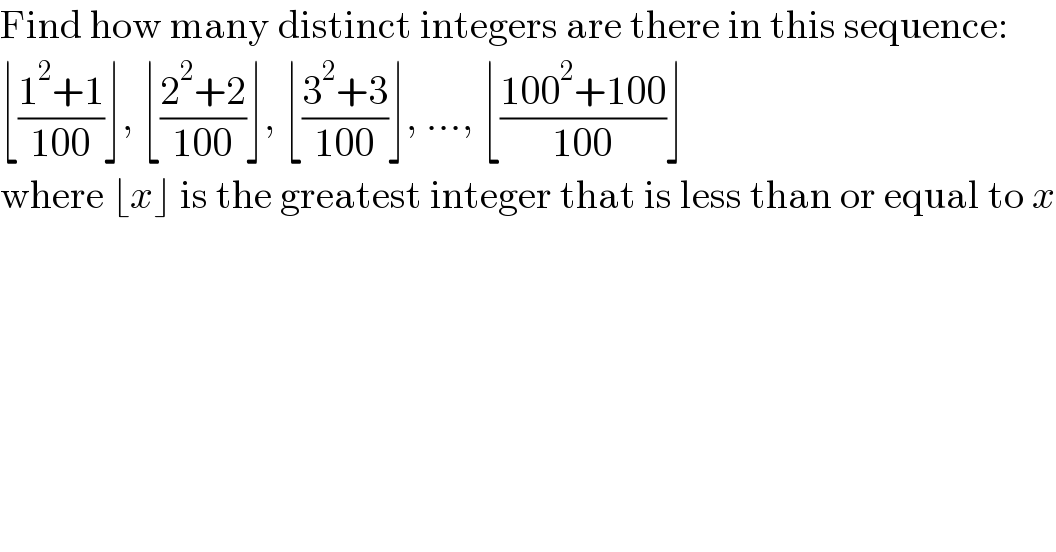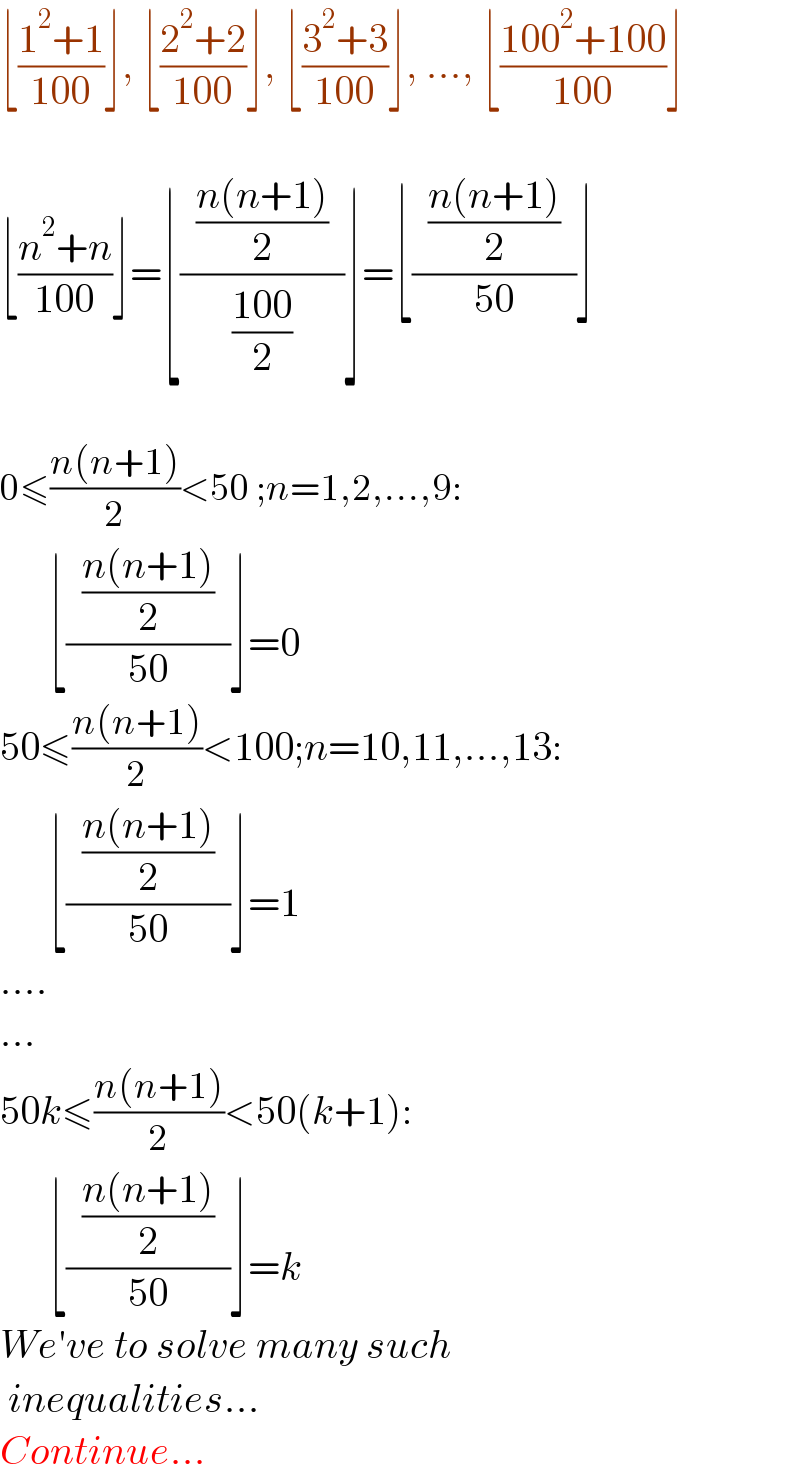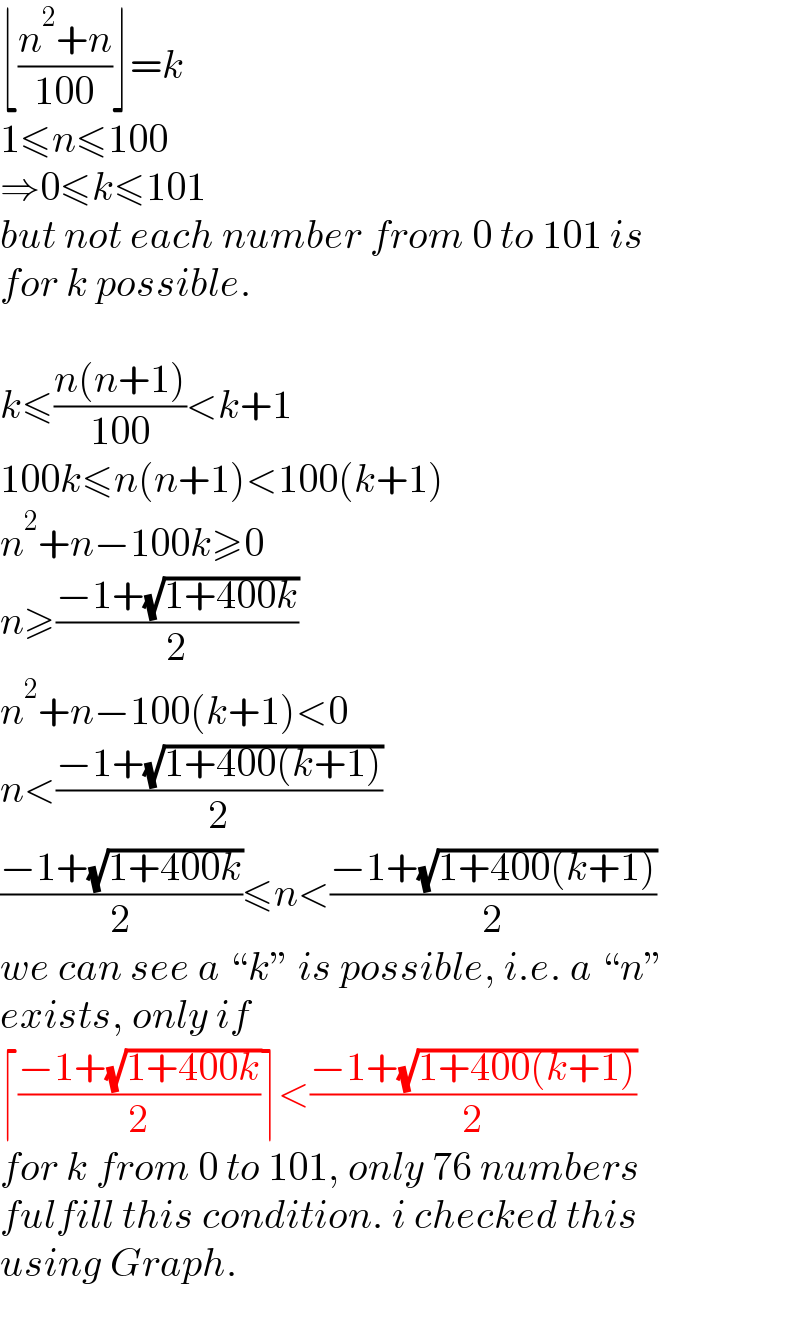
Question Number 176155 by adhigenz last updated on 14/Sep/22

$$\mathrm{Find}\:\mathrm{how}\:\mathrm{many}\:\mathrm{distinct}\:\mathrm{integers}\:\mathrm{are}\:\mathrm{there}\:\mathrm{in}\:\mathrm{this}\:\mathrm{sequence}: \\ $$$$\lfloor\frac{\mathrm{1}^{\mathrm{2}} +\mathrm{1}}{\mathrm{100}}\rfloor,\:\lfloor\frac{\mathrm{2}^{\mathrm{2}} +\mathrm{2}}{\mathrm{100}}\rfloor,\:\lfloor\frac{\mathrm{3}^{\mathrm{2}} +\mathrm{3}}{\mathrm{100}}\rfloor,\:...,\:\lfloor\frac{\mathrm{100}^{\mathrm{2}} +\mathrm{100}}{\mathrm{100}}\rfloor \\ $$$$\mathrm{where}\:\lfloor{x}\rfloor\:\mathrm{is}\:\mathrm{the}\:\mathrm{greatest}\:\mathrm{integer}\:\mathrm{that}\:\mathrm{is}\:\mathrm{less}\:\mathrm{than}\:\mathrm{or}\:\mathrm{equal}\:\mathrm{to}\:{x} \\ $$
Commented by Rasheed.Sindhi last updated on 14/Sep/22

$$\mathrm{102}? \\ $$
Commented by mr W last updated on 14/Sep/22

$${there}\:{are}\:{totally}\:\mathrm{100}\:{integers}.\:{so}\:{the} \\ $$$${number}\:{of}\:{distinct}\:{integers}\:{must}\:{be} \\ $$$${less}\:{than}\:\mathrm{100}. \\ $$
Commented by Rasheed.Sindhi last updated on 14/Sep/22

$${You}'{re}\:{very}\:{right}\:{sir}!{I}'{ve}\:{committed} \\ $$$${mistake}. \\ $$
Answered by Rasheed.Sindhi last updated on 14/Sep/22

$$\lfloor\frac{\mathrm{1}^{\mathrm{2}} +\mathrm{1}}{\mathrm{100}}\rfloor,\:\lfloor\frac{\mathrm{2}^{\mathrm{2}} +\mathrm{2}}{\mathrm{100}}\rfloor,\:\lfloor\frac{\mathrm{3}^{\mathrm{2}} +\mathrm{3}}{\mathrm{100}}\rfloor,\:...,\:\lfloor\frac{\mathrm{100}^{\mathrm{2}} +\mathrm{100}}{\mathrm{100}}\rfloor \\ $$$$ \\ $$$$\lfloor\frac{{n}^{\mathrm{2}} +{n}}{\mathrm{100}}\rfloor=\lfloor\frac{\:\:\frac{{n}\left({n}+\mathrm{1}\right)}{\mathrm{2}}\:\:}{\frac{\mathrm{100}}{\mathrm{2}}}\rfloor=\lfloor\frac{\:\:\frac{{n}\left({n}+\mathrm{1}\right)}{\mathrm{2}}\:\:}{\mathrm{50}}\rfloor \\ $$$$\:\: \\ $$$$\mathrm{0}\leqslant\frac{{n}\left({n}+\mathrm{1}\right)}{\mathrm{2}}<\mathrm{50}\:;{n}=\mathrm{1},\mathrm{2},...,\mathrm{9}: \\ $$$$\:\:\:\:\:\:\lfloor\frac{\:\:\frac{{n}\left({n}+\mathrm{1}\right)}{\mathrm{2}}\:\:}{\mathrm{50}}\rfloor=\mathrm{0} \\ $$$$\mathrm{50}\leqslant\frac{{n}\left({n}+\mathrm{1}\right)}{\mathrm{2}}<\mathrm{100};{n}=\mathrm{10},\mathrm{11},...,\mathrm{13}: \\ $$$$\:\:\:\:\:\:\lfloor\frac{\:\:\frac{{n}\left({n}+\mathrm{1}\right)}{\mathrm{2}}\:\:}{\mathrm{50}}\rfloor=\mathrm{1} \\ $$$$.... \\ $$$$... \\ $$$$\mathrm{50}{k}\leqslant\frac{{n}\left({n}+\mathrm{1}\right)}{\mathrm{2}}<\mathrm{50}\left({k}+\mathrm{1}\right): \\ $$$$\:\:\:\:\:\:\lfloor\frac{\:\:\frac{{n}\left({n}+\mathrm{1}\right)}{\mathrm{2}}\:\:}{\mathrm{50}}\rfloor={k} \\ $$$${We}'{ve}\:{to}\:{solve}\:{many}\:{such} \\ $$$$\:{inequalities}... \\ $$$${Continue}... \\ $$
Answered by Rasheed.Sindhi last updated on 16/Sep/22

$$\ll\underset{\blacksquare\:\boldsymbol{\mathrm{A}}\:\:\:\:\:\:\:\boldsymbol{\mathrm{N}}\:\:\:\:\:\:\:\boldsymbol{\mathrm{S}}\:\:\:\:\:\:\:\boldsymbol{\mathrm{W}}\:\:\:\:\:\:\:\boldsymbol{\mathrm{E}}\:\:\:\:\:\:\:\boldsymbol{\mathrm{R}}\:\blacksquare} {``\boldsymbol{\mathrm{SOMETHING}}\:\boldsymbol{\mathrm{is}}\:\boldsymbol{\mathrm{better}}\:\boldsymbol{\mathrm{than}}\:\boldsymbol{\mathrm{NOTHING}}''}\gg \\ $$$$\lfloor\frac{\mathrm{1}^{\mathrm{2}} +\mathrm{1}}{\mathrm{100}}\rfloor,\:\lfloor\frac{\mathrm{2}^{\mathrm{2}} +\mathrm{2}}{\mathrm{100}}\rfloor,\:\lfloor\frac{\mathrm{3}^{\mathrm{2}} +\mathrm{3}}{\mathrm{100}}\rfloor,\:...,\:\lfloor\frac{\mathrm{100}^{\mathrm{2}} +\mathrm{100}}{\mathrm{100}}\rfloor \\ $$$$ \\ $$$$\lfloor\frac{{n}^{\mathrm{2}} +{n}}{\mathrm{100}}\rfloor=\lfloor\frac{\:\:\frac{{n}\left({n}+\mathrm{1}\right)}{\mathrm{2}}\:\:}{\frac{\mathrm{100}}{\mathrm{2}}}\rfloor=\lfloor\frac{\:\:\frac{{n}\left({n}+\mathrm{1}\right)}{\mathrm{2}}\:\:}{\mathrm{50}}\rfloor \\ $$$$\:\: \\ $$$$\mathrm{50}{k}\leqslant\frac{{n}\left({n}+\mathrm{1}\right)}{\mathrm{2}}<\mathrm{50}\left({k}+\mathrm{1}\right)\:,{k}\in\left\{\mathrm{0},\mathrm{1},\mathrm{2},...\right\}: \\ $$$$\:\:\:\:\:\:\lfloor\frac{\:\:\frac{{n}\left({n}+\mathrm{1}\right)}{\mathrm{2}}\:\:}{\mathrm{50}}\rfloor={k} \\ $$$${For}\:\frac{{N}}{{D}\in\mathbb{N}}\:{to}\:{be}\:{integer},\:{N}\:{should}\:{be} \\ $$$${integral}\:{multiple}\:{of}\:{D} \\ $$$$\begin{array}{|c|c|c|c|c|c|c|c|c|c|c|c|c|c|c|c|c|c|c|c|c|c|c|c|c|c|c|c|c|c|c|c|c|c|c|c|c|c|c|c|c|c|c|c|c|c|c|c|c|c|c|}{{n}}&\hline{\underset{\overset{\mathrm{OR}} {{cumulative}\:{total}}} {{n}\left({n}+\mathrm{1}\right)/\mathrm{2}}}\\{\mathrm{1}}&\hline{\mathrm{1}}\\{\mathrm{2}}&\hline{\mathrm{3}}\\{\mathrm{3}}&\hline{\mathrm{6}}\\{\mathrm{4}}&\hline{\mathrm{10}}\\{\mathrm{5}}&\hline{\mathrm{15}}\\{\mathrm{6}}&\hline{\mathrm{21}}\\{\mathrm{7}}&\hline{\mathrm{28}}\\{\mathrm{8}}&\hline{\mathrm{36}}\\{\mathrm{9}}&\hline{\mathrm{45}<\mathrm{50}\:\:\:\left(\mathrm{1}\right)}\\{\mathrm{10}}&\hline{\mathrm{55}}\\{\mathrm{11}}&\hline{\mathrm{66}}\\{\mathrm{12}}&\hline{\mathrm{78}}\\{\mathrm{13}}&\hline{\mathrm{91}<\mathrm{100}\:\:\:\left(\mathrm{2}\right)}\\{\mathrm{14}}&\hline{\mathrm{105}}\\{\mathrm{15}}&\hline{\mathrm{120}}\\{\mathrm{16}}&\hline{\mathrm{136}<\mathrm{150}\:\left(\mathrm{3}\right)}\\{\mathrm{17}}&\hline{\mathrm{153}}\\{\mathrm{18}}&\hline{\mathrm{171}}\\{\mathrm{19}}&\hline{\mathrm{190}<\mathrm{200}\:\left(\mathrm{4}\right)}\\{\mathrm{20}}&\hline{\mathrm{210}}\\{\mathrm{21}}&\hline{\mathrm{231}<\mathrm{250}\:\left(\mathrm{5}\right)}\\{\mathrm{22}}&\hline{\mathrm{253}}\\{\mathrm{23}}&\hline{\mathrm{276}<\mathrm{300}\:\left(\mathrm{6}\right)}\\{\mathrm{24}}&\hline{\mathrm{300}}\\{\mathrm{25}}&\hline{\mathrm{325}<\mathrm{350}\:\left(\mathrm{7}\right)}\\{\mathrm{26}}&\hline{\mathrm{351}}\\{\mathrm{27}}&\hline{\mathrm{378}<\mathrm{400}\:\left(\mathrm{8}\right)}\\{\mathrm{28}}&\hline{\mathrm{406}}\\{\mathrm{29}}&\hline{\mathrm{435}<\mathrm{450}\:\left(\mathrm{9}\right)}\\{\mathrm{30}}&\hline{\mathrm{465}}\\{\mathrm{31}}&\hline{\mathrm{496}<\mathrm{500}\:\left(\mathrm{10}\right)}\\{\mathrm{32}}&\hline{\mathrm{528}<\mathrm{550}\:\left(\mathrm{11}\right)}\\{\mathrm{33}}&\hline{\mathrm{561}}\\{\mathrm{34}}&\hline{\mathrm{595}<\mathrm{600}\:\left(\mathrm{12}\right)}\\{\mathrm{35}}&\hline{\mathrm{630}<\mathrm{650}\:\left(\mathrm{13}\right)}\\{\mathrm{36}}&\hline{\mathrm{666}<\mathrm{700}\:\left(\mathrm{14}\right)}\\{\mathrm{37}}&\hline{\mathrm{703}}\\{\mathrm{38}}&\hline{\mathrm{741}<\mathrm{750}\:\left(\mathrm{15}\right)}\\{\mathrm{39}}&\hline{\mathrm{780}<\mathrm{800}\:\left(\mathrm{16}\right.}\\{\mathrm{40}}&\hline{\mathrm{820}<\mathrm{850}\:\left(\mathrm{17}\right)}\\{\mathrm{41}}&\hline{\mathrm{861}<\mathrm{900}\:\left(\mathrm{18}\right)}\\{\mathrm{42}}&\hline{\mathrm{903}}\\{\mathrm{43}}&\hline{\mathrm{946}<\mathrm{950}\:\left(\mathrm{19}\right)}\\{\mathrm{44}}&\hline{\mathrm{990}<\mathrm{1000}\:\left(\mathrm{20}\right)}\\{\mathrm{45}}&\hline{\mathrm{1035}<\mathrm{1050}\:\left(\mathrm{21}\right)}\\{\mathrm{46}}&\hline{\mathrm{1081}<\mathrm{1100}\:\left(\mathrm{22}\right)}\\{\mathrm{47}}&\hline{\mathrm{1128}<\mathrm{1150}\:\left(\mathrm{23}\right)}\\{\mathrm{48}}&\hline{\mathrm{1176}<\mathrm{1200}\:\left(\mathrm{24}\right)}\\{\mathrm{49}}&\hline{\mathrm{1225}<\mathrm{1250}\:\left(\mathrm{25}\right)}\\{\mathrm{50}}&\hline{\mathrm{1275}<\mathrm{1300}\:\left(\mathrm{26}\right)}\\\hline\end{array}\:\begin{array}{|c|c|c|c|c|c|c|c|c|c|c|c|c|c|c|c|c|c|c|c|c|c|c|c|c|c|c|c|c|c|c|c|c|c|c|c|c|c|c|c|c|c|c|c|c|c|c|c|c|c|c|}{{n}}&\hline{\underset{\overset{\mathrm{OR}} {{cumulative}\:{total}}} {{n}\left({n}+\mathrm{1}\right)/\mathrm{2}}}\\{\mathrm{51}}&\hline{\mathrm{1326}<\mathrm{1350}\:\left(\mathrm{27}\right)}\\{\mathrm{52}}&\hline{\mathrm{1378}<\mathrm{1400}\:\left(\mathrm{28}\right)}\\{\mathrm{53}}&\hline{\mathrm{1431}<\mathrm{1450}\:\left(\mathrm{29}\right)}\\{\mathrm{54}}&\hline{\mathrm{1485}<\mathrm{1500}\:\left(\mathrm{30}\right.}\\{\mathrm{55}}&\hline{\mathrm{1540}<\mathrm{1550}\:\left(\mathrm{31}\right)}\\{\mathrm{56}}&\hline{\mathrm{1596}<\mathrm{1600}\:\left(\mathrm{32}\right)}\\{\mathrm{57}}&\hline{\mathrm{1653}<\mathrm{1700}\:\left(\mathrm{33}\right)}\\{\mathrm{58}}&\hline{\mathrm{1711}<\mathrm{1750}\:\left(\mathrm{34}\right)}\\{\mathrm{59}}&\hline{\mathrm{1770}<\mathrm{1800}\:\left(\mathrm{35}\right)}\\{\mathrm{60}}&\hline{\mathrm{1830}<\mathrm{1850}\:\left(\mathrm{36}\right)}\\{\mathrm{61}}&\hline{\mathrm{1891}<\mathrm{1900}\:\left(\mathrm{37}\right)}\\{\mathrm{62}}&\hline{\mathrm{1953}<\mathrm{2000}\:\left(\mathrm{38}\right)}\\{\mathrm{63}}&\hline{\mathrm{2016}<\mathrm{2050}\:\left(\mathrm{39}\right)}\\{\mathrm{64}}&\hline{\mathrm{2080}<\mathrm{2100}\:\left(\mathrm{40}\right)}\\{\mathrm{65}}&\hline{\mathrm{2145}<\mathrm{2150}\:\left(\mathrm{41}\right)}\\{\mathrm{66}}&\hline{\mathrm{2211}<\mathrm{2250}\:\left(\mathrm{42}\right)}\\{\mathrm{67}}&\hline{\mathrm{2278}<\mathrm{2300}\:\left(\mathrm{43}\right)}\\{\mathrm{68}}&\hline{\mathrm{2346}<\mathrm{2350}\:\left(\mathrm{44}\right)}\\{\mathrm{69}}&\hline{\mathrm{2415}<\mathrm{2450}\:\left(\mathrm{45}\right)}\\{\mathrm{70}}&\hline{\mathrm{2485}<\mathrm{2500}\:\left(\mathrm{46}\right)}\\{\mathrm{71}}&\hline{\mathrm{2556}<\mathrm{2600}\:\left(\mathrm{47}\right)}\\{\mathrm{72}}&\hline{\mathrm{2628}<\mathrm{2650}\:\left(\mathrm{48}\right)}\\{\mathrm{73}}&\hline{\mathrm{2701}<\mathrm{2750}\:\left(\mathrm{49}\right)}\\{\mathrm{74}}&\hline{\mathrm{2775}<\mathrm{2800}\:\left(\mathrm{50}\right)}\\{\mathrm{75}}&\hline{\mathrm{2850}<\mathrm{2900}\:\left(\mathrm{51}\right)}\\{\mathrm{76}}&\hline{\mathrm{2926}<\mathrm{2950}\:\left(\mathrm{52}\right)}\\{\mathrm{77}}&\hline{\mathrm{3003}<\mathrm{3050}\:\left(\mathrm{53}\right)}\\{\mathrm{78}}&\hline{\mathrm{3081}<\mathrm{3100}\:\left(\mathrm{54}\right)}\\{\mathrm{79}}&\hline{\mathrm{3160}<\mathrm{3200}\:\left(\mathrm{55}\right)}\\{\mathrm{80}}&\hline{\mathrm{3240}<\mathrm{3250}\:\left(\mathrm{56}\right)}\\{\mathrm{81}}&\hline{\mathrm{3321}<\mathrm{3350}\:\left(\mathrm{57}\right)}\\{\mathrm{82}}&\hline{\mathrm{3403}<\mathrm{3450}\:\left(\mathrm{58}\right)}\\{\mathrm{83}}&\hline{\mathrm{3486}<\mathrm{3500}\:\left(\mathrm{59}\right)}\\{\mathrm{84}}&\hline{\mathrm{3570}<\mathrm{3600}\:\left(\mathrm{60}\right)}\\{\mathrm{85}}&\hline{\mathrm{3655}<\mathrm{3700}\:\left(\mathrm{61}\right)}\\{\mathrm{86}}&\hline{\mathrm{3741}<\mathrm{3750}\:\left(\mathrm{62}\right)}\\{\mathrm{87}}&\hline{\mathrm{3828}<\mathrm{3850}\:\left(\mathrm{63}\right)}\\{\mathrm{88}}&\hline{\mathrm{3916}<\mathrm{3950}\:\left(\mathrm{64}\right)}\\{\mathrm{89}}&\hline{\mathrm{4005}<\mathrm{4050}\:\left(\mathrm{65}\right)}\\{\mathrm{90}}&\hline{\mathrm{4095}<\mathrm{4100}\:\left(\mathrm{66}\right)}\\{\mathrm{91}}&\hline{\mathrm{4186}<\mathrm{4200}\:\left(\mathrm{67}\right)}\\{\mathrm{92}}&\hline{\mathrm{4278}<\mathrm{4300}\:\left(\mathrm{68}\right)}\\{\mathrm{93}}&\hline{\mathrm{4371}<\mathrm{4400}\:\left(\mathrm{69}\right)}\\{\mathrm{94}}&\hline{\mathrm{4465}<\mathrm{4500}\:\left(\mathrm{70}\right)}\\{\mathrm{95}}&\hline{\mathrm{4560}<\mathrm{4600}\:\left(\mathrm{71}\right)}\\{\mathrm{96}}&\hline{\mathrm{4656}<\mathrm{4700}\:\left(\mathrm{72}\right)}\\{\mathrm{97}}&\hline{\mathrm{4753}<\mathrm{4800}\:\left(\mathrm{73}\right)}\\{\mathrm{98}}&\hline{\mathrm{4851}<\mathrm{4900}\:\left(\mathrm{74}\right)}\\{\mathrm{99}}&\hline{\mathrm{4950}<\mathrm{5000}\:\left(\mathrm{75}\right)}\\{\mathrm{100}}&\hline{\underset{\begin{array}{|c|}{\:\:\:\:\:\mathrm{76}\:\:\:\:\:}\\\hline\end{array}} {\mathrm{5050}<\mathrm{5100}\:\left(\mathrm{76}\right)}}\\\hline\end{array} \\ $$$${Changing}\:{colour}\:\:{of}\:{font}\:{here}\: \\ $$$${means}\:'{other}\:{distinct}\:{integer}'. \\ $$
Commented by mr W last updated on 15/Sep/22

$$\mathrm{sum}\left(\mathrm{if}\left(\mathrm{ceil}\left(\mathrm{a}\left(\mathrm{k}\right)\right)<\mathrm{a}\left(\mathrm{k}+\mathrm{1}\right)\right),\mathrm{k}=\mathrm{0}..\mathrm{101}\right) \\ $$
Commented by Rasheed.Sindhi last updated on 15/Sep/22

$${Ans}:\:\mathrm{76} \\ $$$${adhigenz}\:{sir},\:{please}\:{confirm}\:{the} \\ $$$${answer}\:{before}\:{I}\:{give}\:{final}\:{shape}\:{to} \\ $$$${my}\:{solution}. \\ $$
Commented by mr W last updated on 15/Sep/22

$${answer}\:\mathrm{76}\:{is}\:{correct}\:{sir}. \\ $$
Commented by Rasheed.Sindhi last updated on 15/Sep/22

$$\mathbb{T}\:\boldsymbol{\mathrm{h}}\:\boldsymbol{\mathrm{a}}\:\boldsymbol{\mathrm{n}}\:\Bbbk\:\boldsymbol{\mathrm{s}}\:\:\:\boldsymbol{\mathrm{sir}}! \\ $$
Commented by mr W last updated on 15/Sep/22

$$\lfloor\frac{{n}^{\mathrm{2}} +{n}}{\mathrm{100}}\rfloor={k} \\ $$$$\mathrm{1}\leqslant{n}\leqslant\mathrm{100} \\ $$$$\Rightarrow\mathrm{0}\leqslant{k}\leqslant\mathrm{101} \\ $$$${but}\:{not}\:{each}\:{number}\:{from}\:\mathrm{0}\:{to}\:\mathrm{101}\:{is} \\ $$$${for}\:{k}\:{possible}. \\ $$$$ \\ $$$${k}\leqslant\frac{{n}\left({n}+\mathrm{1}\right)}{\mathrm{100}}<{k}+\mathrm{1} \\ $$$$\mathrm{100}{k}\leqslant{n}\left({n}+\mathrm{1}\right)<\mathrm{100}\left({k}+\mathrm{1}\right) \\ $$$${n}^{\mathrm{2}} +{n}−\mathrm{100}{k}\geqslant\mathrm{0} \\ $$$${n}\geqslant\frac{−\mathrm{1}+\sqrt{\mathrm{1}+\mathrm{400}{k}}}{\mathrm{2}} \\ $$$${n}^{\mathrm{2}} +{n}−\mathrm{100}\left({k}+\mathrm{1}\right)<\mathrm{0} \\ $$$${n}<\frac{−\mathrm{1}+\sqrt{\mathrm{1}+\mathrm{400}\left({k}+\mathrm{1}\right)}}{\mathrm{2}} \\ $$$$\frac{−\mathrm{1}+\sqrt{\mathrm{1}+\mathrm{400}{k}}}{\mathrm{2}}\leqslant{n}<\frac{−\mathrm{1}+\sqrt{\mathrm{1}+\mathrm{400}\left({k}+\mathrm{1}\right)}}{\mathrm{2}} \\ $$$${we}\:{can}\:{see}\:{a}\:``{k}''\:{is}\:{possible},\:{i}.{e}.\:{a}\:``{n}'' \\ $$$${exists},\:{only}\:{if} \\ $$$$\lceil\frac{−\mathrm{1}+\sqrt{\mathrm{1}+\mathrm{400}{k}}}{\mathrm{2}}\rceil<\frac{−\mathrm{1}+\sqrt{\mathrm{1}+\mathrm{400}\left({k}+\mathrm{1}\right)}}{\mathrm{2}} \\ $$$${for}\:{k}\:{from}\:\mathrm{0}\:{to}\:\mathrm{101},\:{only}\:\mathrm{76}\:{numbers} \\ $$$${fulfill}\:{this}\:{condition}.\:{i}\:{checked}\:{this} \\ $$$${using}\:{Graph}. \\ $$
Commented by mr W last updated on 15/Sep/22

Commented by mr W last updated on 15/Sep/22

$${you}\:{did}\:{a}\:{nice}\:{work}\:{sir}\:{using}\:{the}\:{table}! \\ $$
Commented by Rasheed.Sindhi last updated on 15/Sep/22

$$\mathbb{T}_{} ^{\mathbb{H}^{\mathbb{A}} \mathbb{N}} \mathbb{X}\:\:\:\:\:\:\:\:\:\:\:\:\: \\ $$$$\:\:\:\:\:\:\mathcal{S}_{\mathcal{I}} \mathcal{R} \\ $$
Commented by Tawa11 last updated on 18/Sep/22

$$\mathrm{Great}\:\mathrm{sirs} \\ $$
